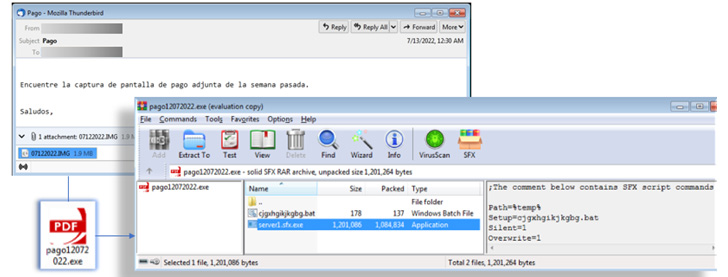[ad_1]
The notorious Emotet botnet has been linked to a model new wave of malspam campaigns that profit from password-protected archive info to drop CoinMiner and Quasar RAT on compromised applications.
In an assault chain detected by Trustwave SpiderLabs researchers, an invoice-themed ZIP file lure was found to incorporate a nested self-extracting (SFX) archive, the first archive showing as a conduit to launch the second.
Whereas phishing assaults like these traditionally require persuading the aim into opening the attachment, the cybersecurity agency talked about the advertising marketing campaign sidesteps this hurdle by making use of a batch file to routinely present the password to unlock the payload.
The first SFX archive file further makes use of each a PDF or Excel icon to make it appear legit, when, genuinely, it contains three components: the password-protected second SFX RAR file, the aforementioned batch script which launches the archive, and a decoy PDF or image.
“The execution of the batch file ends in the arrange of the malware lurking all through the password-protected RARsfx [self-extracting RAR archive],” researchers Bernard Bautista and Diana Lopera talked about in a Thursday write-up.
The batch script achieves this by specifying the archive’s password and the holiday spot folder to which the payload will be extracted, together with launching a command to indicate the lure doc in an attempt to cover the malicious train.
Lastly, the an an infection culminates throughout the execution of CoinMiner, a cryptocurrency miner that may also double up as a credential stealer, or Quasar RAT, an open provide .NET-based distant entry trojan, counting on the payload packed throughout the archive.
The one-click assault methodology may also be notable in that it efficiently jumps earlier the password hurdle, enabling malicious actors to carry out a wide range of actions harking back to cryptojacking, info exfiltration, and ransomware.
Trustwave talked about it has acknowledged an increase in threats packaged in password-protected ZIP info, with about 96% of these being distributed by the Emotet botnet.
“The self-extracting archive has been spherical for a really very long time and eases file distribution amongst end prospects,” the researchers talked about. “Nonetheless, it poses a security risk given that file contents won’t be merely verifiable, and it’ll presumably run directions and executables silently.”
[ad_2]




